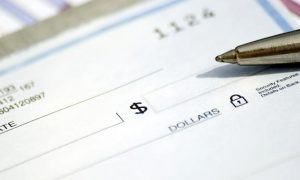You probably haven’t written a check in a minute. Some people under a certain age might have never even owned a checkbook. With Venmo, Cash App, Zelle and other instant payment methods, the need to write a check is becoming less and less necessary, but there are still instances where the check might be the only option — or maybe even the best option depending on your situation.
Check out these reasons on why you shouldn’t throw your checkbook out just yet, and why you might want to get one (if you don’t have one yet).
Checkbooks Are Always Accessible
Ever had a situation where the app you were using to pay just wasn’t working? It kind of leaves you out of options, and you might have to forfeit whatever you’re trying to purchase in the moment. Though a check is probably not the best option for paying your friend back for lunch, it can come in handy when you’re using electronic payment services to pay things like rent and utilities. If your payment app of choice crashes on the last day of the month, you can always write your landlord a check, bypassing any technical difficulties other services are having. This can also work when an ATM is down. You can write yourself a check and walk into the bank to get cash that way. Because of the physical nature of a checkbook, it does have a few advantages where it works really well in emergencies.
Checks Are Good for Record-Keeping
When you write a check, you’re basically documenting that you paid for something. The check itself serves as a receipt. This can be important to have when you’re paying for services, paying someone back for a loan, or pretty much anything else that might be contested in a court of law. You can always find a copy of your check through your bank in the case you might need to show proof of payment.
You Can Avoid Extra Charges
Some businesses might charge a fee if you want to pay with a credit or debit card, or require a minimum spend. Stores typically charge a fee for cards because they have to pay extra every time someone runs a card. Those fees can range from 1-4 percent, so the fee they’re charging you cancels that out for them. Writing a check is almost as good as cash, so merchants might prefer that to a card and not tack on the processing charge. Plus, you can save money this way by avoiding fees and filling up your cart with stuff you don’t need to meet the minimum spend requirement.
Not Everyone Has the Apps
You’re going to encounter people and businesses who don’t have the setup to receive money in any way other than check or cash. It’s not a ton of people, but 7 percent of Americans do not use the internet. In order to pay people like this, or those who don’t have an app to receive money, you’re going to have to need a more analog method. If you don’t feel comfortable carrying large amounts of cash around, a checkbook is necessary in these situations.
You Can Give Checks as a Gift
Giving cash as a gift can get lost easily, but when you write a check and give it to someone, if something were to happen to the check, you can contact your bank that it was lost and write another one. You also might be charged ATM fees to withdraw cash, whereas a check won’t cost you anything to write. Another advantage is that checks can also be mailed to friends and family safely.
Voided Checks Are Sometimes Necessary
If you opt for direct deposit for your paycheck, some workplaces will ask that you submit a voided check so they can set up the transaction. Additionally, you might need to submit a voided check for automated loan or bill payments. That’s because a check includes your bank, routing number and account number all in one place, but since the account holder writes “void” on it, it cannot be used. It’s one of the easier ways for your employer to set up payment, so it’s best to have a checkbook on hand just in case.
The post 6 Reasons You Still Need a Checkbook appeared first on GoBankingRates
Original source: GoBankingRates



